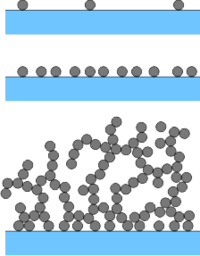Particle deposition

Okay, so let's imagine that you have a big, open field with lots of tiny little particles floating around in the air, like dust or pollen. Now, imagine that you have a piece of paper or a surface that you want to put these particles onto.
Particle deposition is the process of getting these tiny particles to stick to the surface you want them to stick to. Just like how when you put glue on a piece of paper and then stick something to it, the glue makes the thing stick to the paper.
But how do we get these floating particles to stick to a surface? Well, there are different ways to do this. One way is to use an electric charge. Scientists can create a device that has a positive or negative charge, and when the particles float by, they become attracted to the opposite charge and stick to it.
Another way to get particles to stick is through a process called diffusion. This happens when particles move from an area of high concentration (lots of particles in one place) to an area of low concentration (fewer particles in one place). So if you have a surface that is close to a high concentration of particles, some of those particles will naturally "diffuse" onto the surface and stick to it.
Particle deposition is an important process in many industries, like semiconductors or medical devices. Scientists need to be able to control where and how particles stick to surfaces so they can create things like computer chips with the right properties or medical devices that won't cause infections.
So there you have it, particle deposition is all about getting tiny particles to stick to a surface through electric charges or diffusion.
Particle deposition is the process of getting these tiny particles to stick to the surface you want them to stick to. Just like how when you put glue on a piece of paper and then stick something to it, the glue makes the thing stick to the paper.
But how do we get these floating particles to stick to a surface? Well, there are different ways to do this. One way is to use an electric charge. Scientists can create a device that has a positive or negative charge, and when the particles float by, they become attracted to the opposite charge and stick to it.
Another way to get particles to stick is through a process called diffusion. This happens when particles move from an area of high concentration (lots of particles in one place) to an area of low concentration (fewer particles in one place). So if you have a surface that is close to a high concentration of particles, some of those particles will naturally "diffuse" onto the surface and stick to it.
Particle deposition is an important process in many industries, like semiconductors or medical devices. Scientists need to be able to control where and how particles stick to surfaces so they can create things like computer chips with the right properties or medical devices that won't cause infections.
So there you have it, particle deposition is all about getting tiny particles to stick to a surface through electric charges or diffusion.
Related topics others have asked about:
